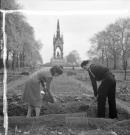“No one in this country of ours wants war
If war should come, we shall not call a halt until the oppressor is beaten
Democracy will triumph
Pay no attention to rumours
All have a vital part to play
You must be ready to obscure all lights in your house
And to extinguish all lights inside
Nobody in this country of ours wants war
But if war should come, don’t be alarmed
Keep a good heart
Whatever happens, Britain is a nation prepared
I have to tell you now, this country is at war”
If war should come, we shall not call a halt until the oppressor is beaten
Democracy will triumph
Pay no attention to rumours
All have a vital part to play
You must be ready to obscure all lights in your house
And to extinguish all lights inside
Nobody in this country of ours wants war
But if war should come, don’t be alarmed
Keep a good heart
Whatever happens, Britain is a nation prepared
I have to tell you now, this country is at war”
inviata da Bernart Bartleby - 2/9/2014 - 10:42
×
![]()





Dall’EP intitolato “The War Room”, scritto e prodotto da J. Willgoose, Esq
Il disco è dedicato alla memoria di George Willgoose (1914-1940), un parente dell’autore, morto durante la battaglia di Dunkirk (o Dunkerque) del maggio-giugno 1940.
Il duo londinese Public Service Broadcasting crea brani di musica elettronica campionando i contenuti di vecchi film e documentari di informazione e propaganda, con l’obiettivo di “insegnare le lezioni del passato attraverso la musica del futuro”… Un’operazione suggestiva…
Il testo qui utilizzato è tratto dall’omonimo filmato “If War Should Come” realizzato nel settembre del 1939 dalla GPO Film Unit per conto del Governo britannico. L’intento era quello di fornire alla popolazione civile dettagliate – quanto inutili e ridicole – istruzioni su come affrontare la guerra portata sul suolo nazionale. Con l’enfasi patriottarda che sempre sottolinea certi momenti storici, lo speaker rassicurava la gente che la Gran Bretagna era pronta ad affrontare ogni emergenza: soltanto durante il “Blitzkrieg” condotto dai nazisti su Londra tra il 7 settembre 1940 ed il 21 maggio 1941 morirono 45.000 abitanti (fino a 139.000 i feriti), la maggioranza dei quali aveva di certo scrupolosamente seguito le istruzioni governative…